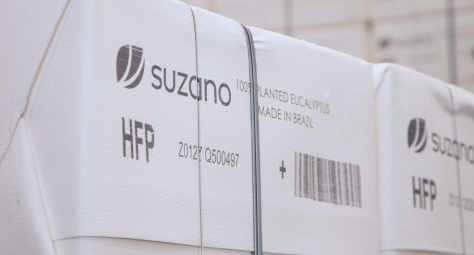sobre o que você deseja falar?


perguntas, sugestões ou problemas técnicos envolvendo a plataforma

informações sobre a empresa


Suzano’s energy matrix is primarily based on renewable sources, strongly emphasizing biomass. This biomass includes bark and rejects from the wood chipping process and black liquor (or bleach), a by-product generated during pulp separation, which serves as the company's primary fuel for energy generation. Additionally, some industrial units have already begun utilizing biological sludge from effluent treatment plants as fuel in biomass boilers, albeit on a small scale.
The company generates surplus energy at its plants in Aracruz (ES), Imperatriz (MA), Mucuri (BA), and Três Lagoas (MS), as well as at the newly completed Ribas do Rio Pardo (MS) plant.
The new plant has an installed capacity of 384 megawatts, adding 105 megawatts to the energy surplus Suzano supplies to the National Interconnected System (SIN)—sufficient to meet the monthly consumption of approximately 1 million people. With this expansion, Suzano is strengthening its role in the generation of renewable energy within the Brazilian energy matrix, aligning with its Commitments to Renew Life, which include the goal of increasing renewable energy exports by 50% by 2030. This commitment underscores the company’s dedication to generating surplus clean energy for the SIN, while promoting sustainability and energy efficiency.
Some consumer units, such as the Teixeira de Freitas Distribution Center (BA), the Inocência Terminal (MS), and the Ribas do Rio Pardo seedling nursery, have migrated to the Free Energy Market, enabling them to be supplied with renewable energy generated by Suzano itself. In addition to generation plants that operate on self-sufficient renewable energy, consumer units are provided internally, ensuring that projects and initiatives aligned with the company’s commitment to renewable energy benefit the entire organization.
Suzano adopts recurring practices (described below) that strengthen its commitment to sustainability and energy efficiency across the entire production and distribution chain to ensure effective management of this issue.
Allocation of own generation
Every month, the electricity consumption of Suzano Group’s consumer units in the Free Energy Market is offset by the surplus generation from Suzano’s exporting plants through the Allocation of Own Generation (AGP) regulatory mechanism. This process is managed via the internal systems of the Electricity Trading Chamber (CCEE) in Brazil.
Sale of surplus energy
After meeting internal energy demands, surplus energy is sold on the Free Energy Market. Suzano utilizes Virtual Power Purchase Agreements (VPPAs) with varying terms, optimizing commercial opportunities while reinforcing its commitment to renewable energy trading and sustainability.
I-REC certification
Since 2022, the Três Lagoas (MS) unit has been certified under the International REC Standard (I-REC), enabling Suzano to issue and trade clean and renewable energy certificates. This initiative underscores the company’s dedication to fostering a sustainable energy matrix while creating value for its stakeholders. In 2024 alone, Suzano sold 264,000 certificates, generating a total revenue of BRL 245,000.
Brazil's energy sector
Suzano actively participates in the Brazilian energy sector and adheres to a comprehensive framework of local and federal regulations, including:
In 2024, the Brazilian energy landscape faced challenges in supplying the National Interconnected System (SIN) through renewable generation sources, mainly due to the hourly intermittency of wind and solar energy. During the dry season, characterized by reduced rainfall, the sector experienced heightened volatility in energy prices and the dispatch of fossil fuel-based plants. As a major exporter of electricity, Suzano plays a pivotal role in the sector by reliably contributing renewable energy to the grid. The company also focuses on optimizing its energy consumption, reducing it whenever operational opportunities arise, reinforcing its commitment to sustainability and efficiency.
The company is also committed to annually reporting its plants' energy consumption data to the Energy Research Company (EPE), the body responsible for compiling the National Energy Balance (BEN). This reporting is crucial for enhancing transparency and reliability in the country’s energy data, providing a solid foundation for strategic planning and decision-making within the Brazilian energy sector. By fulfilling this obligation, Suzano reinforces its role as a responsible and collaborative stakeholder in advancing the nation’s energy goals.
Risks of using biomass as the primary source of energy
Biomass, mainly black liquor derived from wood, plays a critical role in energy generation during the pulp production. The combustion of this byproduct produces steam, which is utilized both for electricity generation and as a key component of the industrial process. Any biomass supply disruption or steam generation system malfunctions can directly impact production efficiency and output.
Although biomass serves as Suzano's primary energy source, the complementary use of fossil fuels, such as natural gas and fuel oil, introduces significant challenges. These include market price volatility, reliance on external suppliers, and potential limitations in the availability of these inputs. Furthermore, using fossil fuels contributes to increased greenhouse gas (GHG) emissions, thereby diminishing the sustainability of the production process.
To mitigate these risks and strengthen its operational sustainability, Suzano adopts several practices:
By integrating these practices into its management model, Suzano mitigates the risks associated with biomass use and reinforces its commitment to energy efficiency and sustainability. This approach ensures the continuity and quality of its production processes while contributing significantly to a cleaner and more renewable energy matrix.
Energy efficiency
Suzano employs a robust approach to energy efficiency in its operations, incorporating waste heat recovery systems and combined heat and power (CHP) cogeneration units. Our pulp manufacturing process features a closed-loop system for steam and thermal energy, where the heat generated at various process stages is reused. This approach optimizes energy consumption and minimizes waste, enhancing operational efficiency and sustainability.
Throughout the period, the company implemented several projects focused on energy efficiency and resource optimization, leveraging advanced technology and sustainable practices. Below are the key initiatives:
Suzano's energy data
In 2024, Suzano enhanced the centralization and automation of energy information, fostering greater integration between technical and business areas. The company strengthened governance across its operations by establishing a single repository, mapping processes, and defining clear responsibilities. This advancement supports simplification and continuous improvement, aligning with Suzano’s corporate principles and reinforcing its commitment to operational excellence and sustainability.
This approach enables Suzano to further expand its contribution to a cleaner, more sustainable, and efficient energy matrix, benefiting not only the company but also Brazilian society as a whole.
The measurements are collected automatically from Suzano's internal systems and, in some cases, are converted into standardized units of measurement. Fuel consumption data was converted into energy consumption based on each fuel's basic density and lower calorific value. When available, the data from the technical specifications sheet of the fuel used was applied. When such data was unavailable, figures from the National Energy Balance [Ministério de Minas e Energia (MME), 2021] were utilized.